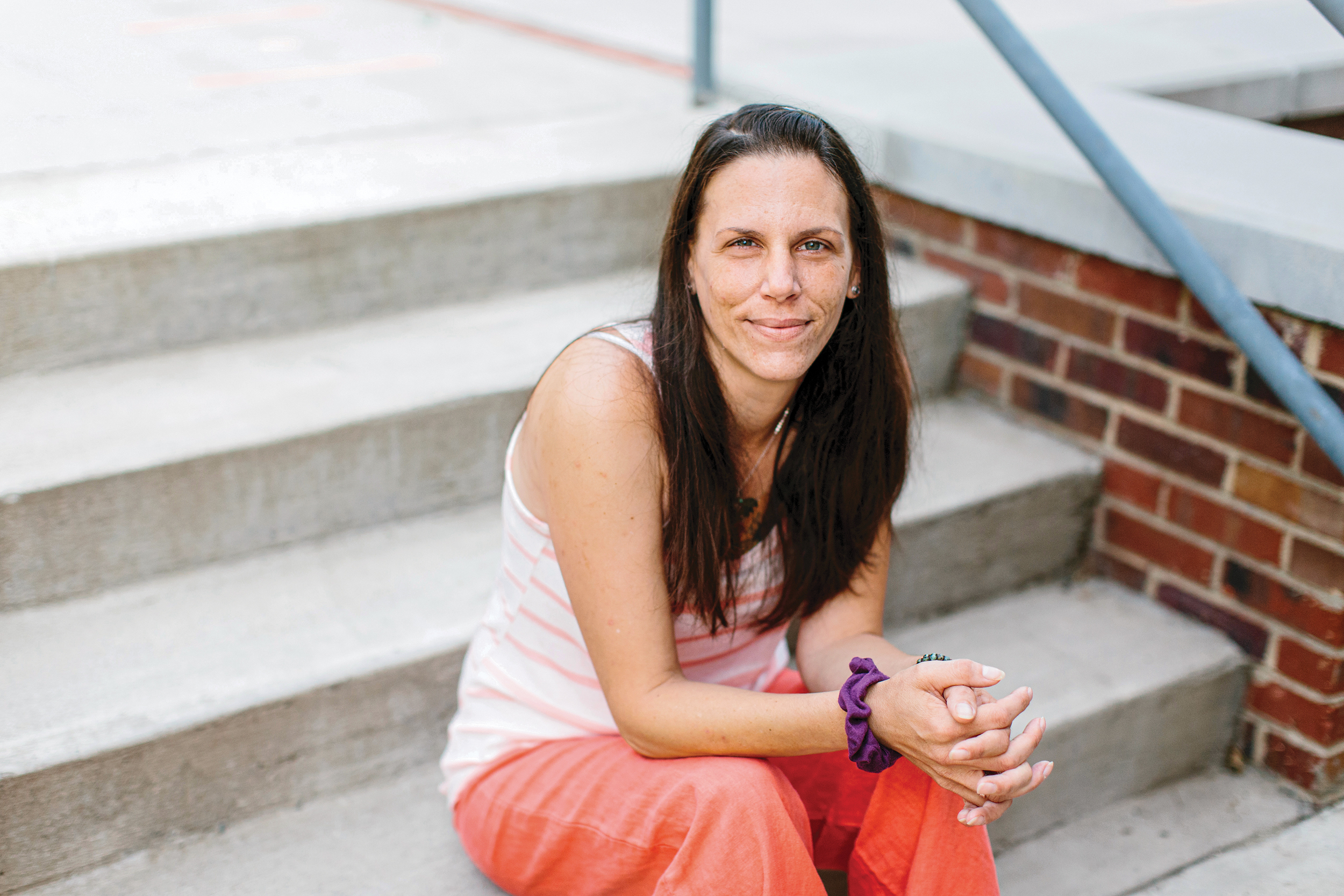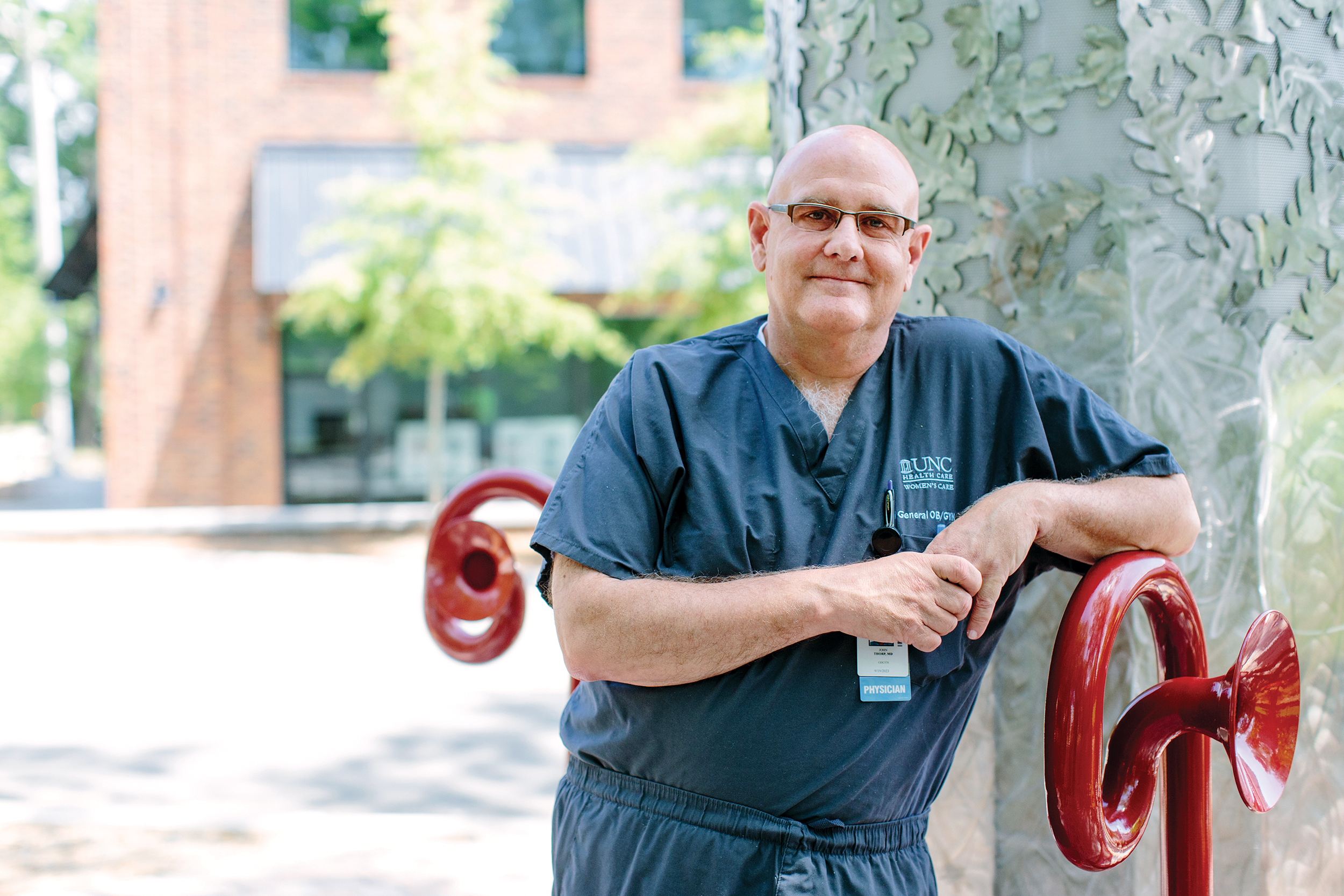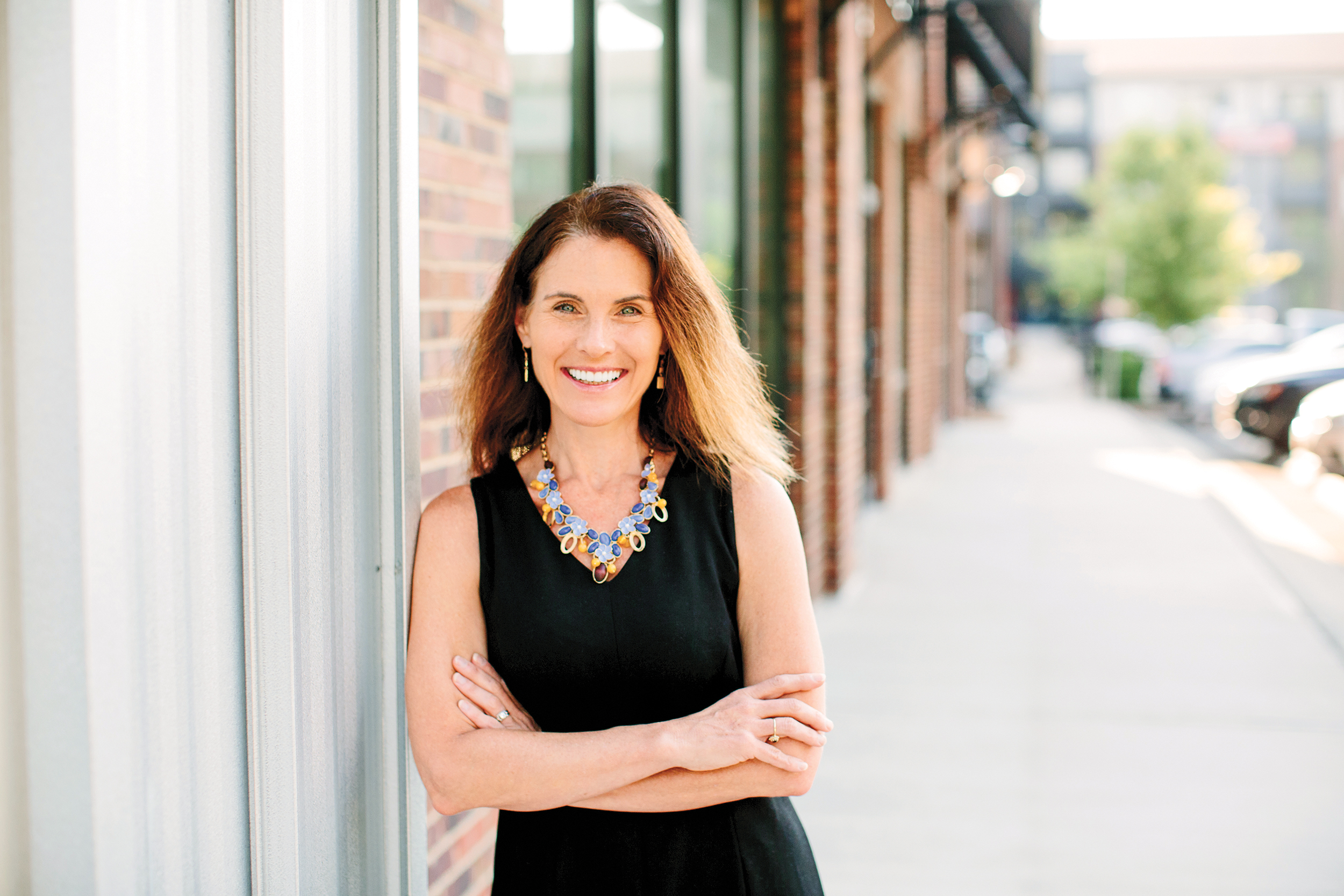The Near Horizons
Posted on Nov. 11, 2019
Horizons moved into its new Carrboro space in 2017. It also joined a national initiative to share technical assistance with other treatment programs. Its model was used to create programs in Wilmington and Asheville. (Anagram Photo/Anna Routh Barzin ’07)
To a woman dealing with pregnancy and child-raising while addicted and abused, life can feel like an avalanche. In 1993, Carolina began building a model solution to a public health crisis.
by Mark Derewicz
Hawn Haywood struggled to break free from the man’s grip. He hit her and pushed her to the ground before she could scramble to safety. This wasn’t the first time he had assaulted and threatened to kill her. It was the last.
Haywood made a phone call. She set a date. With her arrival set, she left work to pick up her 4-year-old son from her mom, and, with only the clothes on their backs, they drove to a friend’s house where the man could not find them. One week later, Haywood arrived at an apartment in Chapel Hill, where five women swarmed her and her son, hugging and welcoming them:
“We’re so happy you’re here, so proud of you, everything is gonna be all right.”
“I’d never met people like this before,” she said. “I thought, ‘What’s in it for them? There has to be an angle. This is just weird.’ ”

Dawn Haywood led a nomadic childhood with drug using parents. As she got older seemingly everybody was poised to take advantage of her. She needed a break from the drugs-and-abuse cycle. (Anagram Photo/Anna Routh Barzin ’07)
Years of drug use and domestic violence had made Haywood suspicious of everyone. These women were residential advisers for a UNC-founded program dedicated to helping women overcome abuse and addiction. Some had been through a similar kind of hell. All had worked with women like her — physically abused, emotionally beaten down, addicted to drugs and pregnant.
Her parents were active drug users — mostly marijuana — and often on the run from the law or friends they’d done wrong. At times during her childhood, they lived in pop-up campers and abandoned houses. When Haywood was a small child, her teacher sexually molested her. Her father physically abused her mother, who eventually divorced him when Haywood was 11. Her mom immediately remarried, to a man who was a heavy drinker.
By the time Haywood was 16, she was stressed and unhappy from all the moving. She befriended a girl who used drugs, and then she joined in.
“From the very first time I got high, I realized, ‘This will take away all the bad stuff that happened to me,’ ” she said, “I won’t think about all these things.”
Her life took a dark turn into addiction and abusive relationships for several years until she swore off men. For three years, with a young son, she was working hard, but she still used drugs. When a friend invited her over one night, Haywood met a man she eventually would marry.
“This is when my life spiraled out of control. This is when things got really, really bad, as if they hadn’t been bad enough.”
It was during these turbulent years when Haywood knew she needed to break free of drugs and abuse, but circumstances beyond her control had made that nearly impossible.
The junior clinician
Dr. John Thorp ’79, a compassionate man whose deep faith informs his teaching and practice, lived with his grandparents for long stretches when he was a child.
“My grandfather had a master’s degree from Columbia, was a master bridge player, a scratch golfer and a terrible alcoholic,” Thorp said. The drinking was a major source of contention for his mom and grandmother. But Thorp didn’t care. He loved his grandfather and saw the good in him. As Thorp’s father spent all summer away from home buying tobacco for his company, Thorp turned to his grandfather as the father figure he says he desperately needed.
“My grandmother would not allow drinking in the home, and so my grandfather took on the task of babysitting me so he could escape the house,” Thorp said. “We left home every morning for our adventures across eastern North Carolina. As he drank, he allowed me to enjoy an array of things that would thrill most young males at the time, such as helping him cheat at poker at the hardware store, visiting the Edgecombe County jail to see who had been admitted overnight, and chasing two elusive fictional characters he created for my entertainment named Mr. X and RedEye.”

Dr. John Thorp ’79. (Anagram Photo/Anna Routh Barzin ’07)
When Thorp got a little older, he saw the hurt his grandfather had caused his family.
“I intuitively knew addiction was a family disease that had a substantial intergenerational impact on adults and children,” he said. “I believe my higher power did for me what I could not do for myself … when my first OB-GYN chair — who was not a boss you disagreed with — gave me the order to join the fellowship program that culminated in Horizons.”
In 1989, Thorp was the UNC OB-GYN department’s newest faculty member. Fresh off a maternal and fetal health fellowship, he hadn’t thought much about addiction. But he had four kids; he’d just gotten this job. He did what his chair wanted.
Thorp saw the ravages of addiction on women as an unaddressed public health crisis.
He says about 80 percent of pregnant women addicted to drugs had experienced severe trauma. Still, pregnant women addicted to drugs often wound up in mental health institutions, on the streets, in prison or in treatment facilities not geared toward their particular trauma. And they would be separated from their babies, which he thought was one of the worst things society could do to a mother battling addiction.
He was one of the few OB-GYNs also trained in the treatment of addiction, and so a few years after Thorp began his career at Carolina, then-Gov. Jim Hunt ’64 (LLBJD) appointed him to a commission to study how the state should best use federal dollars allotted to help women addicted to drugs.
“A woman-centered approach to substance-use disorders was so novel at that time that more experienced expertise was not available for that commission,” Thorp said. “Even a very junior clinician like me, who was willing and interested, was welcome to work on the team.”
“I’d never met people like this before. I thought, ‘What’s in it for them? There has to be an angle. This is just weird.’ ”
— Dawn Haywood, Horizons program graduate and a Horizons residential adviser
The commission suggested creating a recovery program with an integrated staff of OB-GYNs, pediatricians, nurses, psychiatrists and support professionals, among others.
Such a program, Thorp told his fellow commission members, would focus on keeping the mother and baby together. “This is crucial,” he says. “It’s a tremendous motivator to get well, this incredible love the mother has for the child.” And he suggested that pregnant women or new moms needed to receive treatment away from the general population. If they needed mental health treatment, that, too, should be done away from others.
Hunt agreed and allocated about $300,000 to start Horizons.
The program opened in a trailer near the Ambulatory Care Center on Mason Farm Road with Thorp’s first screening for substance-use problems in prenatal patients. Outpatient prenatal clinical care for about 20 women was done at UNC Medical Center, and outpatient addiction and trauma treatment were done at Horizons headquarters. The program enabled women to stay with their babies — even in the spare facilities of the early days — and avoid the debilitating stigma and particular kind of contempt people had (and still have) for pregnant women addicted to drugs.
“From that foundation, we organically and slowly grew,” Thorp said.
At the time, there was no five-star day care, no residential support. Those important pieces of Horizons would come later, as would Thorp’s innovative use of the drug buprenorphine to treat women addicted to narcotics, including heroin.
But from the start, Thorp’s team focused on a deep intervention with each woman. Through their stories, he learned that the demons of addiction were a lifetime in the making.
He supplemented state funds with private grants he scraped together however he could, bending the ears of politicians and cajoling friends and anyone who’d listen that they ought to come to Chapel Hill, rock a few babies to sleep, get to know the staff and hear stories of new mothers trying to do right by their children. He’d also drop some statistics.
By today’s estimates, it costs the state of North Carolina about $60,000 to keep a woman in prison for a year and about $40,000 to place a child in foster care. It costs UNC Horizons $30,000 to $35,000 to keep a family in residence, the mom in treatment and children in day care.
In 1998, the National Center on Addiction and Substance Abuse selected Horizons to be one of 11 sites in the U.S. to develop and evaluate a model of substance-use disorder treatment and employment for low-income women, funded by The Robert Wood Johnson Foundation.
In 2001, Thorp and then-executive director Connie Renz moved Horizons into a former Orange County Health Department building in Carrboro. It was dreary and windowless but more spacious. Horizons started its residential therapy program, securing its first set of apartments. A few years later, Horizons opened the day care and increased treatment services for women from three to five days a week.
The risk of cold turkey
Over the past two decades, an increasing number of women arrived at Horizons addicted to opiates, such as painkillers and heroin, which causes a fast, intense high followed by the inevitable crash and desire for more. For pregnant women addicted to opiates, the standard of care for years was to completely quit using. Withdrawal is intense, but doctors thought it decreased the risk of birth defects and other problems, such as lower birth weights. Doctors also thought quitting drugs would spare babies withdrawal, also known as neonatal abstinence syndrome, which can cause babies to have tremors and trouble eating, sleeping and gaining weight.
But Thorp knew going cold turkey increased the risk of babies being born prematurely, would be immediately life-threatening and set the stage for long-term health issues. He also knew methadone could help these women, just as other treatments had been helping Horizons achieve good birth outcomes for women addicted to other drugs.
Methadone works differently than other opiates, such as heroin. One regulated daily dose of methadone evens out the highs and lows so people can function and focus on their lives instead of where they’d get their next hit. Research showed that methadone treatment substantially decreased the risk of premature birth and avoided the worst of neonatal abstinence syndrome. The problem was primary care doctors or OB-GYNs like Thorp couldn’t prescribe methadone. Due to federal regulations, only special clinics can dispense it.
Meanwhile, Johns Hopkins University researchers had published a landmark paper showing that the drug buprenorphine was as safe as methadone for pregnant women, worked as well and resulted in a milder neonatal abstinence syndrome than did methadone use. And doctors could prescribe it. Thorp used this approach at Horizons, where the premature birth rates were and remain lower than the premature birthrates among the general population in North Carolina.
Thorp is confident he was the first OB-GYN in the state to prescribe medication-assisted treatment and one of the first few in the U.S. Today, buprenorphine is commonly used in clinics.
Because Horizons linked up with the UNC pediatrics department, babies born with buprenorphine in their systems would be closely cared for. Thorp’s approach of using buprenorphine in a controlled manner to help women is now commonly used. Ten years ago, not so much.

Hendree Jones. (Anagram Photo/Anna Routh Barzin ’07)
The lead author of that landmark buprenorphine study was Hendree Jones. In 2011, on sabbatical from Johns Hopkins, Jones was working at RTI International in Research Triangle Park, when a longtime colleague called her to say, “I just went to this conference, and there’s this guy named John Thorp having great success treating pregnant women with buprenorphine.”
Jones responded: “That is amazing! This guy’s a pioneer. I have to meet him.”
Within 30 minutes of meeting Jones at Cafe Carolina, Thorp offered her the job as executive director of Horizons. Jones was stunned. It was a dream opportunity, a dream she first had when she was a 9-year-old girl spending time with disabled children in her mother’s special education classroom. Some of the mothers had been addicted to drugs and victims of domestic violence while pregnant. Jones can still see their faces.
“A 9-year-old girl with my exact birthdate had fetal alcohol syndrome,” Jones says “She was impulsive and had limited language abilities. I remember thinking that could be me if my mom drank during pregnancy. I remember wanting to understand why moms wanted to drink, could we stop them from drinking and how could we help the children?” The spark was lit.
As a behavioral psychology graduate student at the University of Richmond, Jones had worked in a Virginia Commonwealth University lab, which developed the first animal study to examine the effects of prenatal exposure to abused inhalants. Jones continued her work at VCU to earn a doctorate and land an internship at VCU’s Center for Perinatal Addiction to teach women in treatment how drugs affected their bodies and brains.
In her first group session with several women, as Jones shuffled notes and jotted stuff on a white board, one woman crossed her arms and said, “Girl, you don’t know what the hell you’re talking about, do you?”
Jones put aside her notes and said, “No. Why don’t you tell me?” She sat down and listened to those women tell her all about life on the streets of Richmond.
“They taught me way more than I ever taught them,” Jones said. “I got to hear their stories of survival and resilience. I knew I wanted to spend my life figuring out better ways to treat women.”
An international model
In 2017, Horizons moved into new space in Carrboro, and people and politicians across the political spectrum celebrated it at a grand opening, where former client Lucy Brown said: “A horizon is defined as a limit of a person’s mental perception, experience and interests. For more than 20 years, UNC Horizons has worked tirelessly to challenge and broaden the outlooks for thousands of women.”
“Part of what makes us unique is our focus on the mother, the child and the space between them,” Jones said. “Oftentimes, women in recovery were raised in negative environments, and the way they now parent is negative.” Moms can be perpetually at odds with their children.
With therapy, Jones says, mothers and child become more in sync.
“The child therapist helped me the most,” Dawn Haywood said. “I didn’t know how to deal with my kids without leaning on drugs. I didn’t know how to deal with tantrums or how to have quality time with them. Going to group therapy really helped me. I learned I do have something to offer, and that it might be different than what you’re saying. It was hard because I’m such a shy person, but Horizons helped me realize there’s something I can do, it is all my choice, my decision.”
“They taught me way more than I ever taught them. I got to hear their stories of survival and resilience. I knew I wanted to spend my life figuring out better ways to treat women.”
— Hendree Jones, executive director of Horizons
Jones added: “They aren’t ‘wrestling’ with each other anymore. They ‘dance’ with each other. This helps break the cycle of addiction and abuse and trauma in a very real way, but it is slow, tedious, time-consuming work.”
This hyper-focus on the mother-child dyad and the whole life of a mom has caught the attention of peer organizations across the country, and Jones has presented the Horizons model around the world.
In 2018, Horizons joined the Building Bridges Initiative, funded by the Annie E. Casey Foundation, to be part of a team of experts providing technical assistance to other treatment programs.
Horizons’ reputation has attracted paid consulting contracts to help state governments and organizations develop, expand and improve their treatment services to women and children. Horizons has provided consulting to Dartmouth University, Denver Health, the states of Kentucky and West Virginia, and the city of St. Louis, which is attempting to create a model in which the entire city would be geared toward recovery — a Horizons-model for women and children would be the centerpiece. Internationally, Horizons has consulted with organizations in Afghanistan, Argentina, Australia, Brazil, Chile, India, Kenya, Norway, Pakistan, the Republic of Georgia and South Africa.
In North Carolina, Horizons has helped create its model of care at New Hanover Medical Center in Wilmington and at the Mountain Area Health Education Center in Asheville. More than 5,000 women have been part of the Horizons program.
A life recovered
“Horizons saved my life in many, many ways,” Haywood said. “They gave me tools to become a person I could be proud of, the person I was supposed to be before all the chaos of addiction and abuse. Horizons taught me I am worth something and how to deal with life without drugs or running to a man who wasn’t good for me. And … ” she pauses. “God, I’m gonna cry.”
She looks away for a few seconds, dabs her eyes. “Horizons helped me learn how to be a better mom, to pull that good mom out of me who was there all along … but got lost.”
Today, she is content and in love with being a dependable mother to her three children — 4, 10 and 17. They know, to varying degrees, what she’s been through, and they know she’s been dedicated to breaking the cycle of addiction for five years, to being the best mom she can be and to helping women at Horizons get through the kind of hell she’s seen.
“When I look at what I tolerated and what I did — it’s hard to really put into words the changes Horizons helped me make.”
She is a couple of courses away from an associate’s degree in human services from Central Carolina Community College, a path she began more than 15 years ago.
“I have absolutely no doubt about the kind of person I am now, what I stand for, what I believe in, the ways I want to help others realize they can get better, that there is always a way out. You just have to work for it, put in the effort. If you do, there are people here who want to help you and can help you and will help you.”
After a year in recovery away from her old life, Haywood graduated from the UNC Horizons program and before long became a Horizons residential adviser. Now she greets new clients at apartments, encouraging them to overcome addiction and do better by their children.
Mark Derewicz is a communications manager for UNC Health Care and a freelance writer.
Thanks for reading the Carolina Alumni Review
Carolina Alumni members, sign in to continue reading.
Not yet a member? Become one today.
